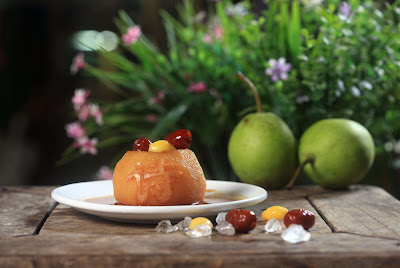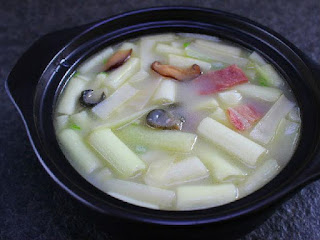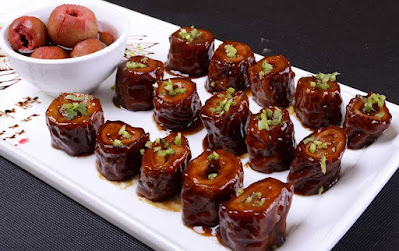Shangdong Food
Ginkgo Nuts of Poetry and Etiquette
Confucius Family Mansion, long known as the "first house of China", is the mansion for generations of Confucius' direct elderly son and elderly grandson and also the "mansion of poetry and etiquette" with the most profound oriental cultural heritage.
In Song Dynasty, the descendants of Confucius built a "Hall of Poetry and Etiquette" within the Temple of Confucius and planted two ginkgo trees. The dish "Maidenhair of Poetry and Etiquette" uses the ginkgo fruits from the ginkgo trees in the Hall of Poetry and Etiquette as the ingredients. Though planted more than one thousand years ago, the two ginkgo trees remain luxuriant, lush, tall and strong. The fruits growing in the trees are extraordinary in which each of them is big in size and full, emitting scents. The chefs of Confucius Family Manson just take the ginkgo fruits off the trees and remove the peel and lipocortin while the fruits are still fresh. Then, put the nuts into the boiling water for a short while and remove the off-smell before bringing them into the juice made of sugar and honey. When the nuts are crispy and tender, put the well prepared gingko nuts in plate, a dish thus being named as "Honey Ginkgo Nuts". This dish tastes cripy and soft and exceptionally sweet, quite popular with the patrons.
Nevertheless, Kong Xiangke, one of Confucius'seventy-fifth generation thought that even though the taste of this dish was good, the name could not be considered presentable and acceptable. Since the ginkgo fruits were from the old haunt of "Home Education of Poetry and Etiquette", this dish was then renamed "Ginkgo Nuts of Poetry and Etiquette", which carried profound meanings, not only remembering the "Family Education of Poetry and Etiquette" of the ancestor Confucius, but also expressing the anticipation that the Kong's family doctrine can pass down through times and become more and more prosperous by reference to the longevity of ginkgo. Since then, this dish rose to its fame.
Cattail with Bone Soup
"Cattails abound in Daming Lake, looking like wild rice shoots and tasting like shoots, are the treasured vegetables in northern provinces.", which is the comment on cattails from the book A Summary of Jinan City. Since the cattails are from a unique places-Daming Lake in Jinan that is formed with the various spring streams, it has always been a kind of precious vegetable. Its eating can be traced back to Zhou Dynasty, as The Book of Song has once said: "The shoots and cattails are very slender", a proof that the ancient people already attained great values to the taste and nutritions of the cattails.
Zang Kejia, a modern famous poet, once wrote a popular essay Hometown Cuisine enumerating the various local cuisines of Jinan, which demonstrated his deep reminiscence about hometown and inspires the readers to feel his homesickness, as if they were just back home. As the essay goes, "There are a lot of cattails, straightening up their green stems among the lotuses in the Daming Lake. Many tourists would always have a meal in a restaurant by the bank of Daming Lake. Though it might be small, there is one famous dish-stir-fried cattails with meat-Speaking of the dish of my hometown, I just have such a different feeling that I seemed to just have returned home, back to my adolescence. "Indeed, the ones who live far from their hometown would never stop missing their home and kinsfolk while they strive for a living, and the homesickness is reflected in our preference for the food from hometown and in the review of home culture.
The ingredients used to cook cattail with bone soup are particular, since it is recommended to use the cattails that only grow in mid May and August for they have the best flavor. Before cooking, it is necessary to soak the cattails into the water for three to four hours, and scald the cattails with boiling water. Make sure to get the cattails out of the boiling water the moment they are scalded. The cattails taste light itself, thus cooking it with bone soup of heavy taste would deliver a much greater taste. Therefore, the combination of the local crisp cattails and the heavy and mellow bone soup just makes the reputable "Cattail with Bone Soup". Having been existing more than one hundred years since it came into being, this dish is still quite popular with local people with fame.
Four-Joy Meatballs
It is said that Four-Joy Meatballs were first developed in Tang Dynasty. One year, the imperial court held the imperial examination that attracted many students from all country to take part in, among whom there was the subsequently renowned Zhang Jiuling, "First Man from the South of the Five Ridges". To everyone's surprise, the poorly dressed Zhang took the first place in the examination and later became the son-in-law of the Emperor. Usually, people are in high spirits when involved in happy events, yet he suffered deeply in his mind since the rampant flood in his hometown drove his parents to flee to other places without any news. It happened that prior to the wedding day, Zhang got the news about his parents and sent the servants to pick them up to the Capital. On the wedding ceremony, the chef who understood the feelings of Zhang tacitly cooked specifically four big meatballs, and explained to Zhang who asked about its implied meaning." It is named 'Four Consummation'. The first consummation is your achievement of the first place in the imperial examination, the second for your wedding, the third for you to become the Emperor's son-in-law, and the last for your reunion with your family. Upon this answer, Zhang Jiuling had a great laugh and said, "Just call it'Four-Joy Meatballs". Since then, the Four-Joy Meatballs were passed down from generation to generation until current days.
Though it seems an easy task to cook this dish with only four big meatballs and some simple ingredients, it requires lots of attention and elaboration at each step in the cooking process. Soak the chopped green onions in a large spoon of warm water for ten minutes, and then filter out the green onions with only the water kept for later use, a process ensuring that no green onions would turn dark in the frying pot and affect its good appearance and taste. This exquisite process well illustrates how detailed and fine the cooking processes are.
First, add some greasy ingredients into the meat stuffing,and it is better to prepare the meat stuffing manually, not only because it is easy to prepare with hands, but also because the stuffing would be chewy yet not greasy. Then the addition of some condiments, such as soybean sauce and cooking wine, would make the flavor even more richful. In order to retain the shape of the meatballs after being fried, it is required to repeatedly beat the meat stuffing up and down so that the meatballs would taste good, juicy, tender but not greasy, with an attractive appearance. The meticulousness is demonstrated in each part of the life, and also in the processes of cooking delicious food. It confirms again the famous saying that nothing in the world is difficult for one who sets his mind to it.
Nine-Bend Large Intestines
Nine-bend large intestines is a famous local dish of Shandong Province. For the Chinese people, the number "nine" means the largest, highest and most lucky. Since ancient times, all the Chinese people, ranging from emperors and high-ranking officials to ordinary citizens, showed special preference to the number "nine".
In the period of Guangxu reign (1875-1908) of the Qing Dynasty, the owner of Jinhualin Restaurant in Jinan created the special dish highly acclaimed and well received by customers. Prior to the cooking, the owner thoroughly cleaned pigs' large intestines, added spices to them, then boiled them until they became chewy and crisp. He took out the boiled intestines out of the pot, cut them into sections, added soy sauce, sugar and spices to them. By then, a fragrant, fat yet not greasy and palatable dish-"Soy Sauce Large Intestines" was ready.
Later he improved the preparation method as follows: He boiled cleaned large intestines in a pot, fried them with oil, added seasonings and spices to them before cooking them until they were well done. In this way, Soy Sauce Large Intesines became more delicious. After tasting the delicacy, some men of letters compared it to "making elixir of life by nine times", for its appealing appearance and extreme delicious taste. Therefore, its original name was changed into Nine-bend Large Intestines.
Wucheng Spiral Pancake
Wucheng spiral pancake is a famous snack of Shandong Province. Legend has it that in the 17th year of the Chongzhen reign (1644) of the Ming Dynasty, Daring King Li Zicheng led his army to launch an attack on Beijing. When passing by Wucheng, he smelled the fragrance of baked pancakes. He dismounted from his horse and entered a roadside shed selling stuffed pancakes. He and his entourages ate the pancakes with stuffing to their hearts' content, and then watched its cooking process with great interest. The chef skillfully rolled out flour wrappers, added mixed stuffing, made wrappers into buns before putting the stuffings into pancakes with hands and baking them until they were light yellow. Finally, put them into a stove with a pile of over 100 pieces of broken tiles to bake them until they were golden yellow.
After watching the preparation process of pancakes, he could not help saying: "Nice! Delicious! Wonderful! I have traveled all over the country but it's the first time for me to see such a fabulous process. It's no wonder that the pancakes have a special aroma." Then he pointed at the signboard outside of the shed and said: "Why don't we call it Spiral Pancake?"
Since then, "Wucheng Spiral Cake" has gradually become well known throughout the country. It is as thin as a finger, and as large as a plate, crisp outside and tender inside. Usually, the pancakes are stuffed with pork, beef, mutton and eggs, being fat but not greasy as well as fragrant and tasty.
Brothers-in-Law Shark's Fin
Brothers-in-law shark's fin is a noted dish of Shandong. Here brothers-in-law refers to the husbands of two sisters whose father was the owner of a large-scale restaurant. Legend goes like this: in the period of Qianlong reign (1736-1795) of the Qing Dynasty, the restaurant owner with the surname of Gao had two beautiful girls, who were married to two skilled chefs of the restaurant respectively.
One day, the emperor Qianlong passed by the restaurant during his inspection in disguise to the regions south of the Yangtze River. As it was getting dark, the emperor entered it for a meal. His guards asked the boss to prepare an "auspicious and wealthy dish" for the noble guest (the emperor). Seeing the guest with a dignified bearing, the restaurant boss Mr.Gao thought he must be a high-ranking official. Hence, he asked his two sons-in-law to prepare a dish with great care.
The two chefs thought the matter over and over again, and finally decided to stew a dish of white and transparent shark's fins with chicken broth. When it was served on the table, Emperor Qianlong was very delighted by the pure white and crystal-clear shark's fin. After tasting it, he was profuse in praise. The emperor asked the chefs: "What's the name of the dish?" The elder brother-in-law showed resourcefulness in an emergency and answered: "White Jade Setting off Silver Bars." "It is too vulgar", the emperor said. Upon knowing the dish was prepared and innovated by the two brothers-in-law, Qianlong Emperor named it "Brothers-in-Law Shark's Fin".
Since then, this dish has been spread far and wide in the whole country. Actually, what attracts all of us is not only the flavor of the dish, but more importantly the spirit carried forward in the story that wherever we are from, as long as we gather together, what we should do is to strive in partnership and make concerted efforts, creating a better tomorrow.















No comments